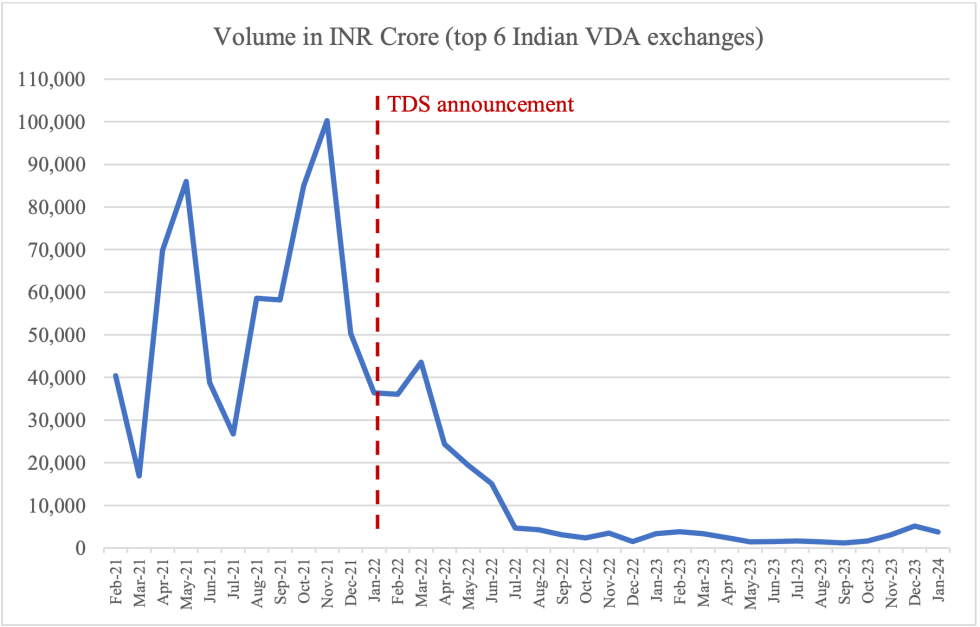As a researcher with a strong background in the Indian financial market and a keen interest in digital currencies, I find the omission of any mention or regulatory clarification regarding digital currencies in India’s Union Budget 2024-25 deeply concerning.
Many Indians are deeply contemplating the impact of the proposed Union Budget for the year 2024-25, with great curiosity coming from the cryptocurrency sector, which now faces uncertainty.
On July 23rd, Finance Minister Nirmala Sitharaman presented the budget without addressing the digital currency sector, despite earlier rumors and expectations of regulatory clarity or beneficial initiatives.
At present, as the world’s digital currency sector experiences increasing acceptance and oversight, India stands out for its unique handling of these assets, presenting a significant distinction in its policies.
2022 Tax Status Quo Continues: Community Reactions
In the proposed budget, there were nine key areas identified for fostering economic expansion, including agriculture and job creation. However, digital currencies were not included in these priorities. This omission is viewed as a missed opportunity to establish a regulatory structure that could encourage innovation and investment in this burgeoning sector.
As a crypto investor, I’ve noticed that while the budget brought significant modifications such as eliminating angel tax for startups and adjusting the equalization levy, there was no mention of these changes in relation to digital currency assets. Consequently, the existing digital currency tax framework remained unaltered.
The lack of digital currency allocation in India’s budget has surprised and alarmed the digital currency community, with prominent figures like developer Vijay Saran expressing their worries on platform X about this seemingly overlooked aspect.
Union Budget 2024 Update:
There is not even a single mention of Crypto in the #unionbudget2024
In the union budget 2024-25, the Indian government made no announcements concerning cryptocurrencies. As a result, the tax rate for crypto transactions remains at 30%, and the Tax Deducted at Source (TDS) continues to be 1%.
— Vijay Saran (@imvijaysaran) July 23, 2024
Based on Saran’s perspective, the absence of regulation for digital currency markets in the budget implies that the existing crypto tax structure from 2022 will persist. This means that cryptocurrency transactions will be subject to a tax rate of 30%, with an additional 1% being deducted at the source (TDS).
Among the most stringent tax regulations worldwide, these measures notably have a significant effect on the business operations of digital currency exchanges and investors within the country.
India’s budget discussion continues without acknowledgment of cryptocurrencies, such as #Crypto. To stimulate the use of cryptocurrencies within India, it is essential to consider decreasing the crypto taxes. #CryptoAdoptionInIndia
— Shubham Datta (@shubhamdat429) July 23, 2024
Impact of India’s Crypto Tax
The strict tax policies have significantly diminished the digital currency market in India. As reported by the National Academy of Legal Studies and Research (NASLAR), since their introduction, trading volumes on Indian platforms have dropped by an astounding 97%, and there has been a substantial decrease of 81% in active user engagement.

The study conducted by NASLAR revealed that these market downturns negatively impact the digital currency sector and cost the Indian government approximately 59 billion Indian rupees ($700 million) every year.
As a researcher, I’ve come across an intriguing finding from a recent study published by NASLAR. Instead of imposing a high tax on cryptocurrency transactions, they propose capping it at 0.01%. According to their findings, this seemingly lower rate could potentially double the government’s revenue from this industry.

Featured image created with DALL-E, Chart from TradingView
Read More
- SOL PREDICTION. SOL cryptocurrency
- USD ZAR PREDICTION
- BTC PREDICTION. BTC cryptocurrency
- CKB PREDICTION. CKB cryptocurrency
- USD COP PREDICTION
- EUR ILS PREDICTION
- TROY PREDICTION. TROY cryptocurrency
- NOTE PREDICTION. NOTE cryptocurrency
- UFO PREDICTION. UFO cryptocurrency
- PRIME PREDICTION. PRIME cryptocurrency
2024-07-24 04:42